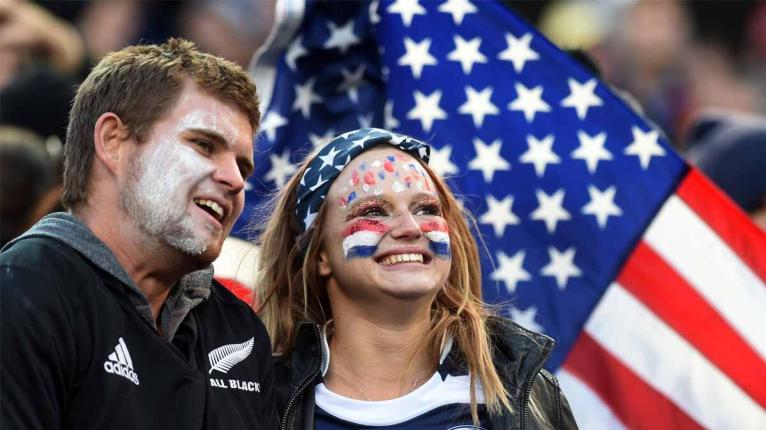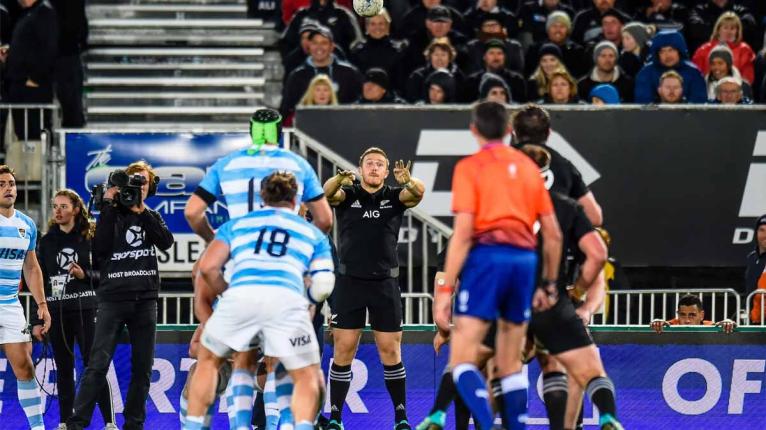It was over 100 years ago that the All Blacks first squared off against the USA Eagles, notching a 51-3 win in California in 1913.
That test – just the 21st in New Zealand’s history – set a record for the All Blacks’ biggest win over any international side that wasn’t to be surpassed for 74 years.
While the All Blacks have been unsurprisingly selective in their opposition throughout history, the advent of the Rugby World Cup in 1987 brought with it fixtures between the top-ranked sides from around the globe and the minnows of the time.
On the road to the All Blacks’ first World Cup title, they handed 60-point drubbings to both Italy and Fiji, in their first encounters with the sides.
Four years later – almost eight decades after their first clash – the All Blacks again faced off with the Eagles, scoring a 46-6 win at the World Cup hosted in the United Kingdom.

Their third and most recent encounter came in 2014, in a game which again saw New Zealand run away with a comfortable victory, this time triumphing 74-6 in Chicago.
So despite kicking off their rivalry in 1913, before coming up against the likes of Italy, Argentina or even the old foe South Africa, this weekend’s upcoming fixture will mark just the fourth time that the All Blacks and Eagles have gone toe to toe – but don’t be surprised if the periods between tests continues to contract.
From 78 years to 23 years to seven years, the USA are quickly becoming a hot ticket item for the All Blacks and New Zealand Rugby, even if the Eagles aren’t necessarily making quite as quick strides on the field.
While comments surrounding ‘growing the game’ will undoubtedly be bandied about from the respective unions, the All Blacks would not have travelled to Maryland if there weren’t significant financial incentives on offer.
That’s not a criticism of NZR. Covid has hit every union’s coffers and when a golden goose throws itself onto your lap during trying times, you’d be silly to turn it down.
There’s a constant chatter that North America could be the ideal location for a World Cup in the near future and while that showpiece tournament would undoubtedly raise rugby’s standing, there’s needs to be a strong foundation to build from, which is what Japan managed so superbly in 2019.
‘Trying times’ could become the new normal, however, and it wouldn’t surprise to see a greater number of matches between New Zealand and the likes of USA, Japan and even Spain or Hong Kong regularly find their way onto the annual calendar.
It’s also why the epic clash between the All Blacks and England at Twickenham seems to so rarely make an appearance on the schedule. The RFU are well aware of the pulling power of their own brand and while NZR might be able to negotiate a nice financial bonus for travelling to Cardiff, Dublin of Rome, England will never struggle to sell out their home fixtures, with or without the All Blacks.
Games between the likes of NZ and the smaller nations do hold a bigger appeal than just their financial promises, of course.
Major League Rugby’s continued growth in America should help the sport increase its appeal – even if the USA and Canada aren’t necessarily seeing huge gains at the top level just yet, with both nations falling to their South American opposition in their recent Rugby World Cup qualifiers.
There’s a constant chatter that North America could be the ideal location for a World Cup in the near future and while that showpiece tournament would undoubtedly raise rugby’s standing, there’s needs to be a strong foundation to build from, which is what Japan managed so superbly in 2019.

From an on-field perspective for the All Blacks, this weekend’s fixture will hand Ian Foster and his fellow selectors the opportunity to reintroduce a number of key players that have been absent from the squad for some time whilst also giving opportunities to the fringe members of the 38-man group.
Sam Whitelock and Dane Coles will almost certainly get their chances to make their first appearances since considerably earlier in the season while Sam Cane is set for his first run of the year.
Add in 21-year-old uncapped lock Josh Lord, as well as other younger All Blacks such as Ethan de Groot, Tupou Vaa’i, Finlay Christie, Quinn Tupaea and Braydon Ennor, and the team that runs out on Saturday will strike little resemblance to the team that was pipped at the post by the Springboks at the beginning of the month.
But while the match against the Eagles does loom as a great opportunity for fringe players to stretch their legs and showcase their talents, it should be noted that the men the All Blacks rolled out in Chicago in 2014 didn’t all find luck on the highest stage following the match.
Just five players from that blow-out victory still hold their spot in the current squad: Cane, Joe Moody, Patrick Tuipulotu, TJ Perenara and Brodie Retallick.
Given the bloated size of the squad – necessary thanks to the 10-match tour the All Blacks are currently just halfway through – a significant number of players who have clocked up minutes in 2021 won’t be given quite as easy a ride into the matchday 23 in seasons to come.
Two further featured at the 2019 Rugby World Cup: midfielders Sonny Bill Williams and Ryan Crotty, while 16 in total played at the 2015 tournament, which kicked off less than a year after the match against the Eagles.
That leaves seven men whose significant All Blacks journeys ended soon after the win: Nathan Harris, Jeremy Thrush, Aaron Cruden, Charles Piutau, Cory Jane, Israel Dagg and Augustine Pulu.
Some, such as Cruden, Jane and Dagg, had already accrued plenty of mileage with the men in black and simply found themselves usurped by younger models, with fewer injury problems. Cruden is the sole member of the trio to still be playing professional rugby, suiting up for Kobelco Steelers in Japan’s Rugby League One.
The likes of Thrush, Piutau and Pulu, however, never really reached their peaks for the All Blacks. Thrush and Pulu weren’t second or third choice at the time but, given the nature of the match, were elevated into the side to offer rests to the likes of Sam Whitelock and Aaron Smith, who went on to have significant workloads on the rest of NZ’s end of year tour that season.
The challenge for men like Lord, Christie and Ennor is to not fall to a similar fate. Given the bloated size of the squad – necessary thanks to the 10-match tour the All Blacks are currently just halfway through – a significant number of players who have clocked up minutes in 2021 won’t be given quite as easy a ride into the matchday 23 in seasons to come. Even if they put in career-best performances against the USA, it won’t be enough to upset the apple cart, but underwhelming performances won’t go down well.
Piutau, of course, was a different story to the other two, with the now-29-year-old earmarked for great things in the black jersey but instead choosing to head north to improve his earning capabilities.

That leaves Nathan Harris, who scored the All Blacks’ first try in the 2014 win but was forced off the field just moments later after tearing ligaments in his ankle on a supporting run. At the time, Harris was the side’s third-choice hooker, sitting behind Keven Mealamu and Dane Coles, but was pushing his more senior positional rivals for minutes.
That injury, however, set the tone for what’s become the rest of Harris’ career, with injury upon injury preventing the 29-year-old from ever having the extended run of play needed to really assert himself.
Codie Taylor jumped the hooking queue in 2015, with Harris unable to participate in Super Rugby, and after a few more major injury setbacks over the years, the Bay of Plenty representative has now found himself in the unfortunate position where he’s likely to miss out on a spot in next year’s inaugural Super Rugby Pacific competition.
The game against the USA was supposed to be Harris’ opportunity to announce himself to the world, even if it was against relative minnows of the game. In hindsight, it was the beginning of the end for promising young hooker.
It might not be injury that pulls the rug out from some of this weekend’s starters, but Harris’ plight should serve as a reminder for all young All Blacks that making the squad, the matchday 23 or even the run-on side is not when the hard work ends, it’s when it begins.
Saturday’s clash will provide some up-and-coming stars the chance to showcase their talents and, in all likelihood, there’ll be many clashes of a similar nature to come in the future. And while no one will see the fixture as the pinnacle of the All Blacks’ calendar – at a team or individual level – it could be the start of a pathway to a brighter future.



Comments
Join free and tell us what you really think!
Sign up for free